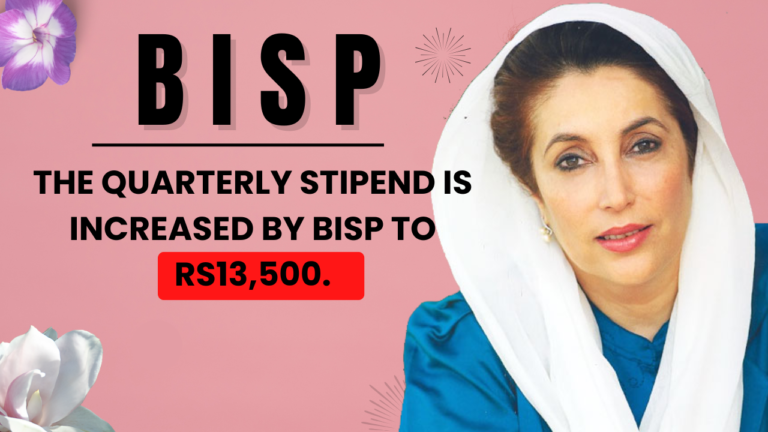The quarterly stipend is increased by BISP to Rs13,500.
BISP Increases Quarterly Stipend to Rs13,500 to Support Vulnerable Families
The Benazir Income Support Programme (BISP) has announced an increase in its quarterly stipend, raising it from Rs12,000 to Rs13,500. This adjustment aims to provide additional financial relief to millions of underprivileged families across Pakistan amid ongoing economic challenges.
Enhanced Support for Economic Stability
The decision to enhance the stipend is part of the government’s broader strategy to mitigate the financial burdens faced by the country’s most vulnerable populations. Inflationary pressures, rising costs of essential goods, and the lingering effects of global economic disruptions have significantly impacted low-income households. By increasing the stipend, BISP seeks to address these pressing challenges and improve the quality of life for beneficiaries.
In a statement, the Federal Minister for Poverty Alleviation and Social Safety emphasized the importance of the increase: “The government remains committed to supporting the underprivileged. The stipend adjustment reflects our dedication to ensuring that no family is left behind in the pursuit of economic stability.”
Impact on Beneficiaries
The increase in the quarterly stipend will benefit over 8 million registered families, who rely on BISP assistance to meet their basic needs. For many, this financial aid is a lifeline, enabling them to afford essentials such as food, healthcare, and education for their children. Beneficiaries have expressed relief and gratitude for the government’s decision.
“This increase will help us cope with rising expenses. It’s not just money; it’s hope for a better future,” shared Fatima Bibi, a BISP recipient from Punjab.
Commitment to Transparency
To ensure the funds reach the intended recipients, BISP has reinforced its commitment to transparency and accountability. The program employs advanced biometric verification systems and digital payment methods to eliminate fraud and enhance the efficiency of disbursements. Officials have reassured the public that these measures will be further strengthened as the stipend increase is implemented.
Broader Social Initiatives
The stipend adjustment aligns with BISP’s mission to promote social and economic inclusion. In addition to financial aid, the program offers complementary initiatives, including skill development training, health insurance, and educational scholarships for children of beneficiary families. These initiatives aim to empower families to break the cycle of poverty and achieve self-sufficiency.
Economic analysts have lauded the stipend increase as a timely intervention. “Given the current economic climate, this step is essential for sustaining low-income households. It’s a critical component of social protection,” noted Dr. Asim Khan, an economist specializing in poverty alleviation.
Challenges and the Road Ahead
While the increase is a welcome development, challenges remain. Experts have highlighted the need for a comprehensive strategy to address the root causes of poverty, such as unemployment and lack of access to quality education and healthcare. BISP’s initiatives, though impactful, are seen as part of a larger framework that requires collaboration between various government departments and stakeholders.
The government has also urged private-sector organizations and international donors to contribute to social safety programs. Collaborative efforts, they argue, can amplify the impact of initiatives like BISP and ensure sustainable development for marginalized communities.
Public Reaction and Future Plans
The announcement has garnered widespread support from citizens, advocacy groups, and policymakers. Many see it as a testament to the government’s commitment to addressing the needs of the underprivileged. However, some critics argue that periodic reviews and adjustments to the stipend amount should be institutionalized to keep pace with inflation and economic realities.
Looking ahead, the BISP administration has hinted at additional measures to expand the program’s reach. Plans include increasing the number of beneficiaries and introducing more comprehensive social protection schemes tailored to regional and demographic needs.
Conclusion
The increase in the quarterly stipend under the Benazir Income Support Programme to Rs13,500 marks a significant step toward alleviating poverty and supporting vulnerable families in Pakistan. As the program continues to evolve, its emphasis on transparency, empowerment, and sustainability ensures that millions of citizens can look forward to a more secure and dignified future.







